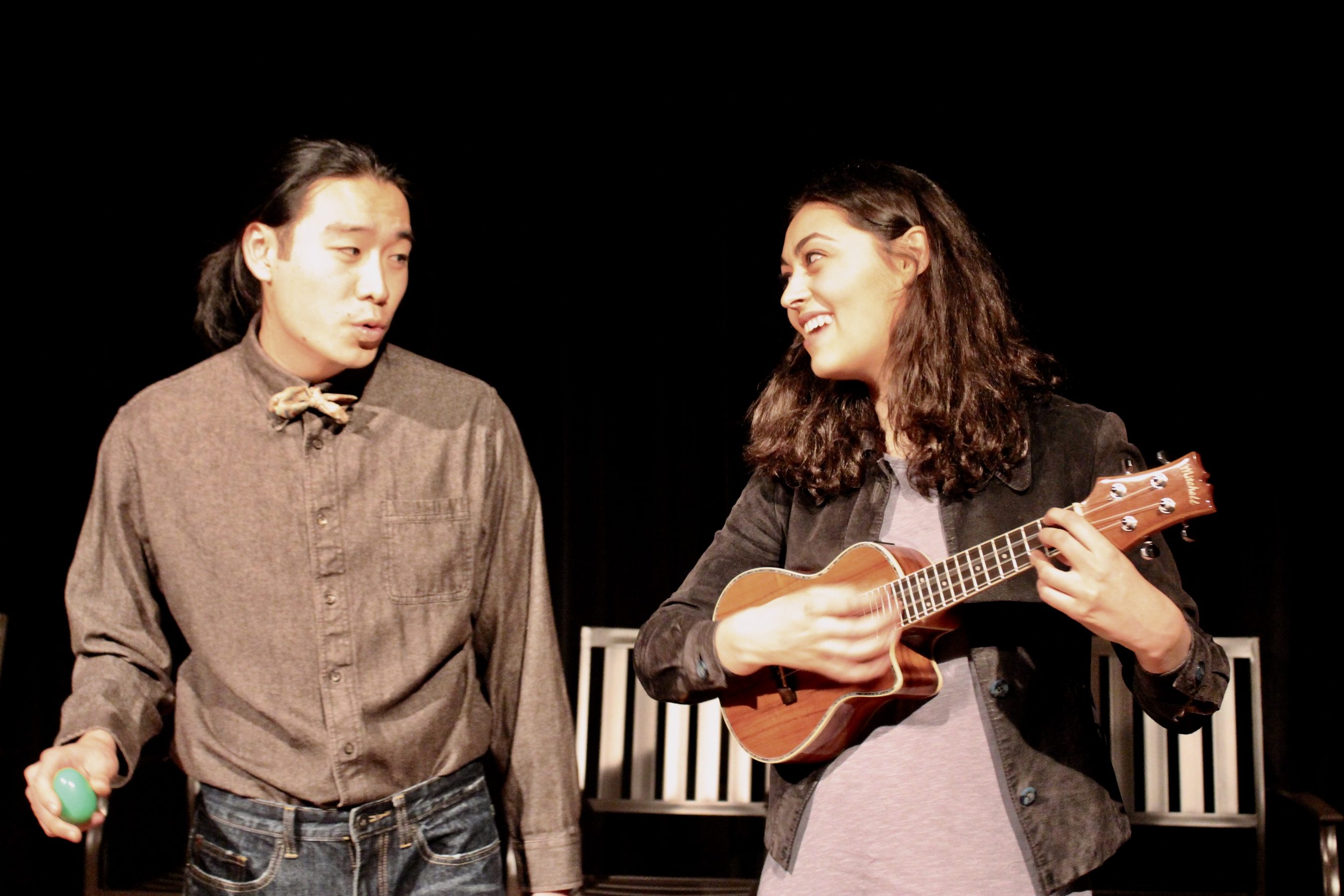The lights dim. An actor steps forward and scowls at the still-settling audience. “The play will begin when someone says, ‘Start the f**king play,’” he says. There’s silence, hesitation, and then a voice emerges from the audience, “. . . start the f**king play?”
From its opening line, the Mask and Bauble Dramatic Society’s final student theater group production of the spring semester, Stupid F**king Bird, is a metatheatrical and profanity-laden exploration of love, loss, and the struggle of being human. Adapted from the play The Seagull by Anton Chekhov, Stupid F**king Bird is playwright Aaron Posner’s modern take on the romantic and artistic conflicts of characters made famous in Chekhov’s work.
“It’s a diagnosis for theater. It’s an anathema to what theater has become in this country, and it’s one of the boldest plays I’ve ever read,” said student director Alex Yurcaba’s (COL ’18). “[It] represents on stage what we find in life.”
The show makes it clear that love is not logical and follows no laws. Over the course of four years, a story of adoration, lust, and failed relationships emerges among the show’s seven characters and dramatically shapes the paths their lives follow. Like its classic predecessor, Stupid F**king Bird’s romantic relationships are convoluted and unrequited, a painful reminder to anyone who has ever loved or been loved without reciprocation.
Johnny Monday (COL ’18) gives an emotionally-charged and equally hilarious performance as the show’s protagonist Conrad, a struggling writer stuck in the shadow of his mother’s fading acting career. Conrad feverishly desires the love of his muse, the young actress Nina (Asha Merz [COL ’20]), while ignoring the affections of the brooding and angsty Mash (Maddy Rice [COL ’20]). Quiet and unassuming Dev (Travis Fujita [MSB ’18]) is hopelessly in love with Mash, but fails to ever dissuade her love for Conrad. Nina appears to reciprocate Conrad’s love until she falls for the self-righteous literary novelist Doyle (Kevin Berning [COL ’20]), who is dating the aging and conceited actress Emma (Kylie Navarro [COL ’20]), Conrad’s mother and a representative of the theater Conrad is trying desperately to revolutionize.
At times, Stupid F**king Bird teases its self-awareness, often breaking the fourth wall. Leaving ample room for improvisation, cast members are able to personalize characters with their own commentary and encourage audience participation in matters of love, life, and even death. “What’s great about this play is that it’s metatheatrical and that the actors get to communicate with the audience,” said Yurcaba. “By virtue of that, every performance is necessarily going to be different, because every audience is different.” Yurcaba attributes many memorable moments in the show to his actor’s abilities to use their instincts and decide on new character traits.
Stupid F**king Bird artfully mixes the humorous and the profound, sometimes even in the same sentence. There are laugh-out-loud moments, fueled by political commentary and outrageous digressions from the script, but there are also scenes that are raw and deeply relatable. Characters question the things we try not to think about, but can never seem to ignore. Why aren’t I loved? Why will I never be enough? Why even go on?
The show addresses difficult issues like suicide, infidelity, and coming to terms with aging, detailing both their causes and how their effects can be more impactful than anticipated. The most powerful scenes often often evoke discomfort among cast members, and require a heightened maturity and sense of familiarity between them. But actor Kevin Berning commended the production’s commitment to the the script and its meaning, saying, “you have to play it truthfully. Otherwise, it’s just going to make the audience uncomfortable in the wrong way.”
Stupid F**king Bird is a well-directed and superbly acted production that crafts an honest exploration of love and its many flaws. Posner’s adaptation tackles contemporary issues with irony and angst, and its actors deliver a powerful social commentary on art, relationships, and life itself as the play progresses. Why do they want to change the world? Because it needs changing.





